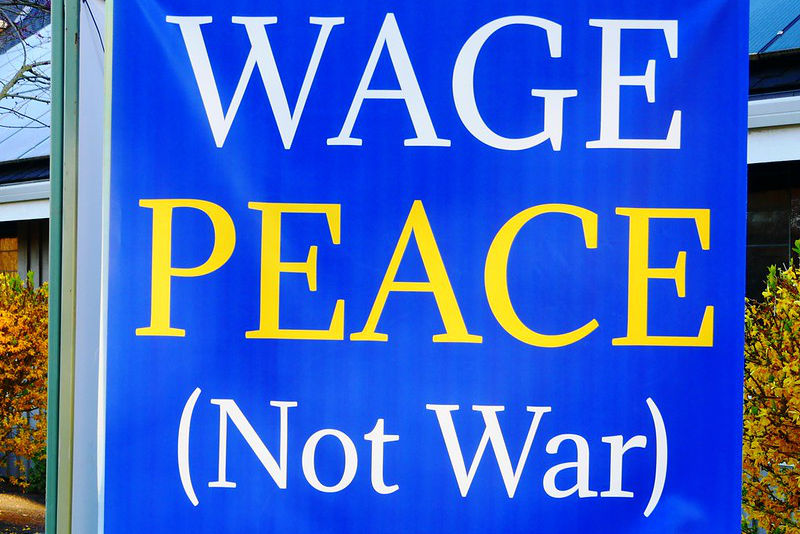Peace needs to be waged!
August 13, 2022
Thank you, Bob Carr, for reminding us of the difference between a diplomacy of peace and a diplomacy of war (P&I, Aug 6, 2022).
Helmut Schmidt, a former chancellor of Germany, once commented about emerging political leaders, that his fear was that they had not personally experienced the horror of war. What is happening in the Ukraine is horrific. I know that it happens in every war. But if your wife is raped in front of you and then caste aside, if your child is murdered, and your city is destroyed then the horror becomes personal and overwhelming. No politician should therefore use language of redlines or preparing for war in order to maintain peace.
But when the lions roar, it is difficult to hear the song of the nightingale.
A legitimate war against an aggressor who disregarded all the rules of international order is being fought in the Ukraine. Guns are blazing, homes are destroyed, women are raped, children are killed in body and soul. Since February 24, 2022, our world has changed. Not only the brutality of war, but also war talk, and war thought is in the air.
It is therefore important to remind ourselves that the nightingale is still singing! One of the fathers of the enlightenment, Immanuel Kant, in 1795 penned an important essay on Perpetual Peace. In it he reminds us that war is what comes to us naturally, while the state of peace must be formally instituted (2nd Section).
With over 13.000 nuclear weapons held by nine countries (USA, Russia, China, France, India, Israel, North Korea, Pakistan, the UK), but also placed in Italy, Germany, Belgium, the Netherland, and Turkey not to speak of biological and chemical weapons! we cant think and talk of war in traditional ways.
Traditional theories like war is the continuation of policy with other means (Carl von Clausewitz, 1780-1831), or the ancient Roman igitur qui desiderat pacem, praeparet bellum (if you want peace, prepare for war recently updated by the Regan doctrine of peace through strength), or even the so-called Just War Theory no longer work in the nuclear age.
We long for a conversion from a culture of war to a culture of peace. Humanity needs to implement the aim of the United Nations to save succeeding generations from the scourge of war. The passion for peace needs to sink deeply into our personal and national consciousness.
A culture of peace is not pacifist in an ideological sense. But it entails a presumption against war. Such a presumption can only be overturned as a last resort and only by the parliament as a representative of the people. Such a presumption for peace needs to be deep seated. We need to develop a spirituality of peace. Peace, not war, needs to be the default in our national conscience.
Putin has interrupted our modern way of life. Even after the annexation of Crimea, even after the Russian bombing of Grozny and Aleppo, the political class did not expect that Vladimir Putin would invade the Ukraine, break international agreements, break international law, and start a war. He alone is the aggressor, and he must be stopped. Just as we have a moral duty to stop someone shooting children in a school or shooting people in a shopping centre, so we have a moral duty to help the Ukraine in their attempt to stop the aggressor Putin. But such help must arise from a deep commitment to peace.
What most articles on the topic fail to appreciate is that we need a spirituality of peace. People need to be so committed to peace that it becomes part of their personal and social identity. And it must become an election topic. We dont need leaders that lack imaginations for peace.
Reference to John Lennons Imagine or Beethovens Ode to Joy may not be enough. We need to dig deeper to the reality that inspired them. We need to ask each other whether at the centre of reality there is conflict which makes war inevitable, or whether at the centre of reality the is love and peace, and therefore we can find other solutions than war to deal with human conflicts. Let us call on all people of good will and on all religions to search deeply into what inspires them and retrieve the visions that make for peace.
As a Christian I point to resources that the Christian faith can offer for a spirituality of peace:
- For Christians, God is the God of Peace.
- Jesus of Nazareth is confessed as the Lord of Peace. He said that peacemakers will be called children of God.
- Life, love, and peace are characteristics of Gods Spirit.
- There is an underlying melody in the Hebrew and Christian Bibles that speak of converting swords into plowshares.
- A number of peace churches (Mennonites, Quakers, Brethren) have refused to follow the just war theory that is followed by so many other churches and thereby kept the song of peace in the air.
- A long line of humans from the suffering servant in Hebrew Scriptures via the Apostle Paul to Mahatma Gandhi, Dietrich Bonhoeffer, Thich Nhat Hanh, and Martin Luther King, Jr. in our time, have helped us to distinguish between the weakness of power and the power of weakness.
Let us not allow for the horror of war to drown out the possibilities of peace. Let us decide for a conscious and conscientious presumption for peace. Thereby we will help to build an open, free, and resilient society_._ Let us elect politicians of intellect and culture who are committed to invest in diplomacy rather than weapons.
